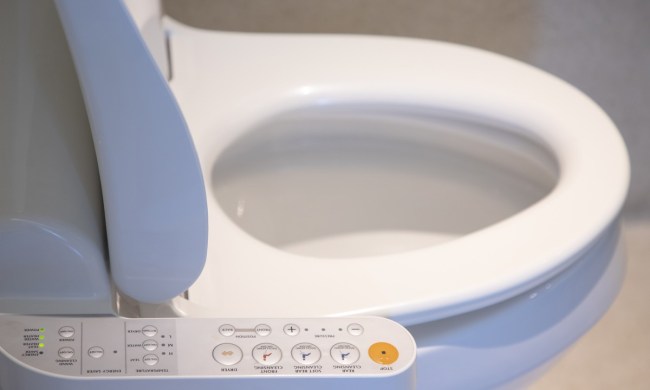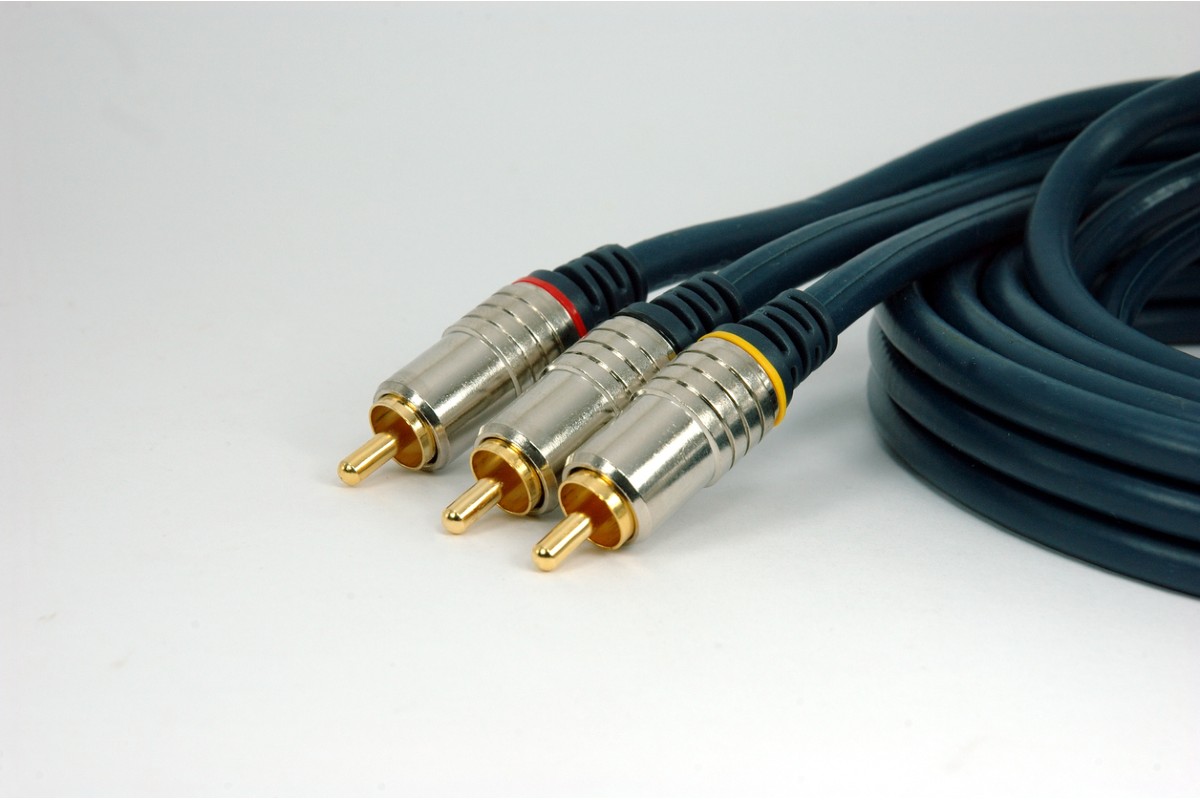
The best home entertainment system can create an immersive, cinema-like atmosphere when you have the right speaker wire. The quality of your speaker wire makes a world of difference to your audio experience, ensuring seamless connectivity, optimal signal transmission, and the ultimate sound production.
We’ve put together a list of the best speaker wires for home theaters in 2024, each possessing unique features to enhance your audio-visual journey. We found that the GearIT speaker wire offers a combination of exceptional durability and sound quality, but each option on our list can take your home theater to the next level.
The best speaker wires for home theaters
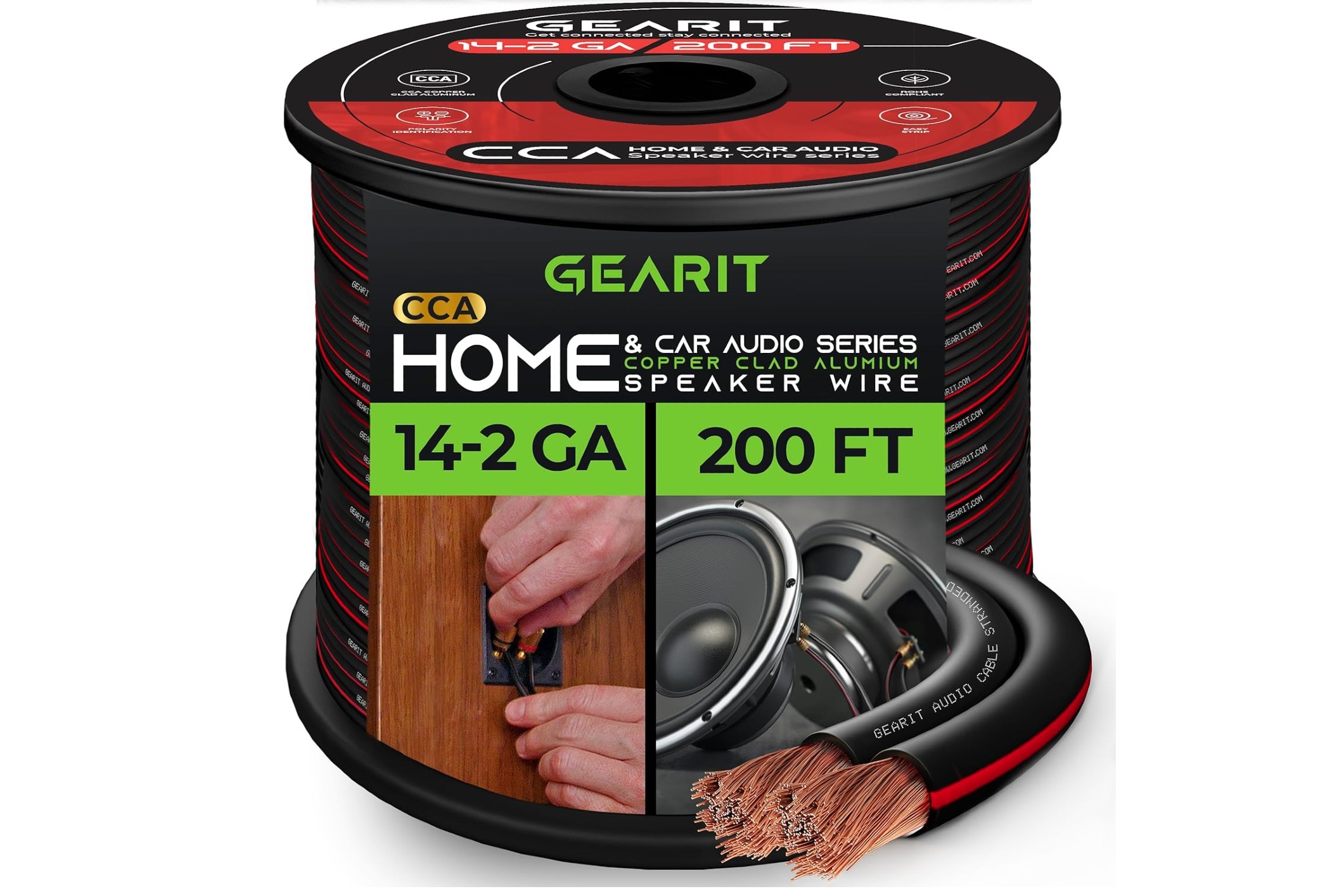
GearIT speaker wire for home theater – Best overall
Step into the world of immersive sound experience with the GearIT speaker wire for home theaters. This option is a game changer for those who’ve been waiting for a new speaker wire to level up your home theater or car speaker system. Spanning an impressive 200 feet and delivering an excellent surround sound experience, you’ll find yourself engulfed in the audio quality it transmits. Whether you’re watching a blockbuster film or hosting a party, the sound output will take the experience up a notch.
This wire is easy to install in any home theater. You’ll be surprised at how smoothly it integrates into your existing setup. Its adept flexibility and durability make it an exceptional choice for long-term use. The black outer layer adds to its sleek look, making it not just an audio enhancement, but also an aesthetic addition. If you’re planning to seriously upgrade your sound system, this option is the way to go. This speaker wire for home theaters gets the top overall spot on this list thanks to the impressive length and high-quality sound transmission.
Pros:
- Thick and flexible insulation
- Suitable for long-distance setup
- Enhances surround sound quality
Cons:
- Almost too big for push button connections
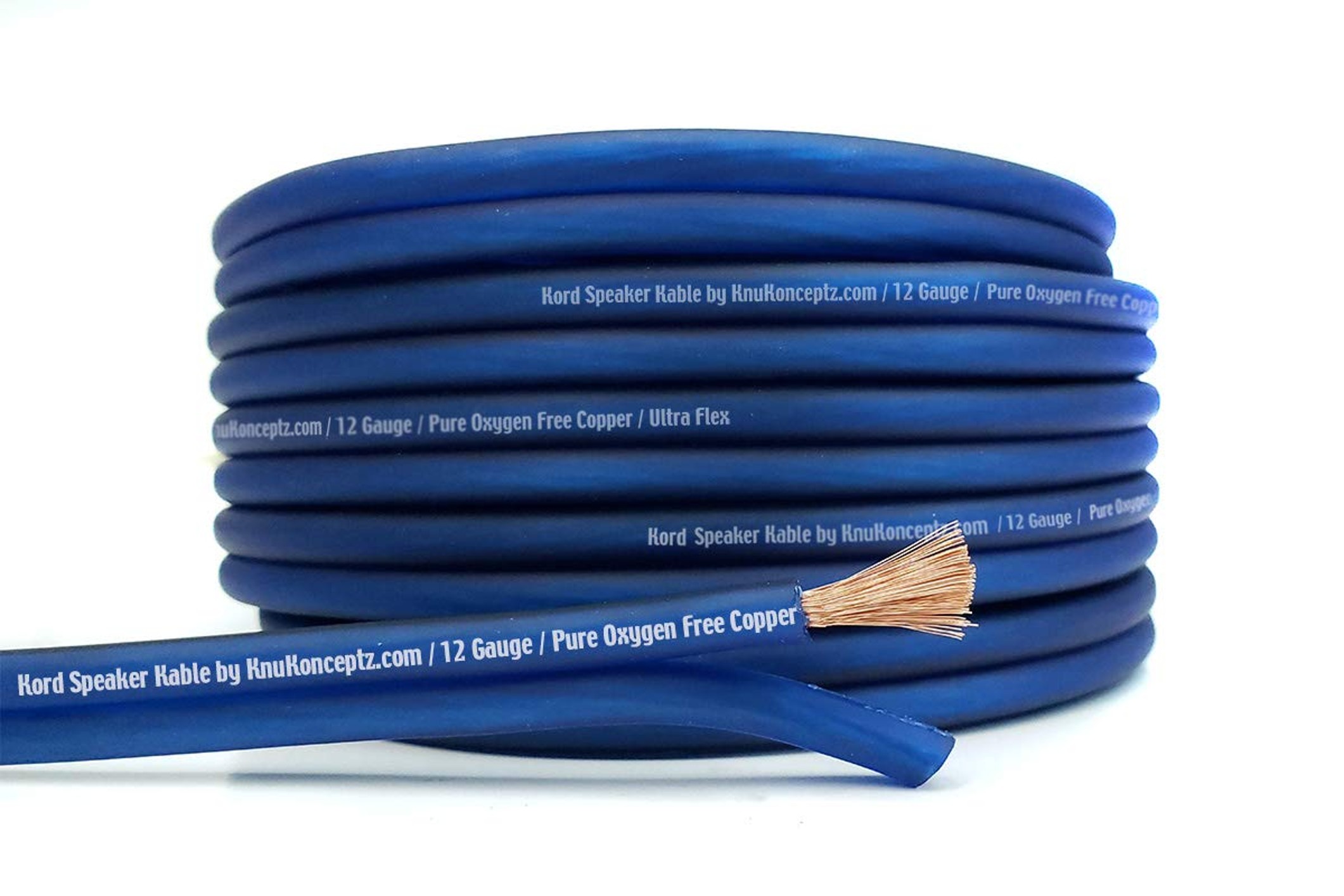
KnuKonceptz speaker wire for home theater – Best sound quality
Have you ever wished your entertainment setup had a bit more oomph or that the sound quality was just a bit clearer? That’s where KnuKonceptz speaker wire for home theaters comes in. This choice isn’t just any old speaker wire but the secret ingredient to exceptional sound quality improvement in your home theater. It provides enough length to give you the flexibility to customize your setup to your heart’s content.
What sets this speaker wire for home theaters apart is how it lends an enhanced sound quality that is hard to rival. The clarity of sound it delivers is nothing short of extraordinary. It’s the ideal choice if you’re looking to elevate your audio experience. The bass is deeper, the treble is clearer, and the overall audio experience is more immersive.
Pros:
- Provides high-quality sound
- Easy to set up
- Reduces electromagnetic interference
Cons:
- Requires additional quality plugs for connection
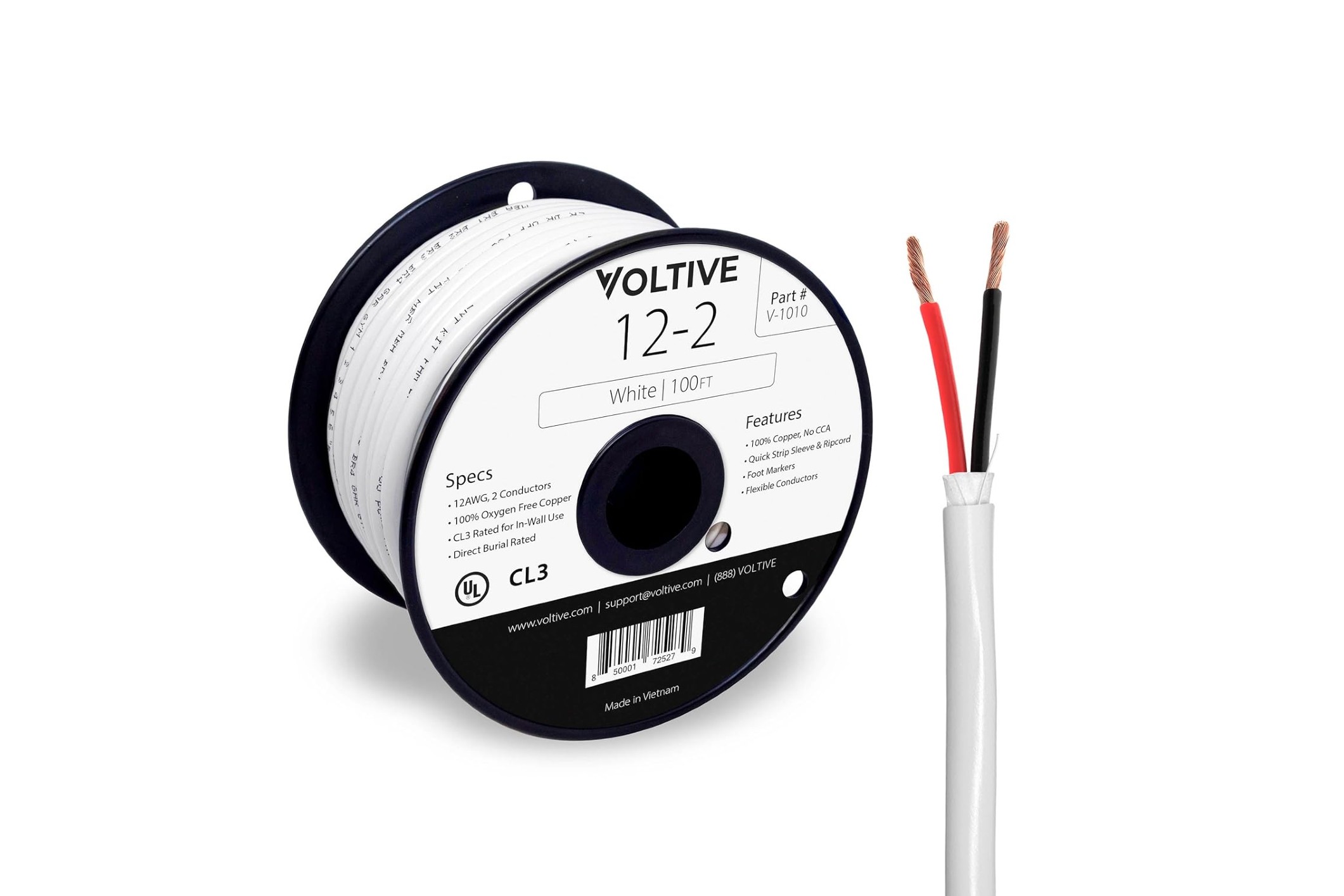
Voltive speaker wire for home theater – Best build quality
Unleash the true potential of your home theater system with the Voltive speaker wire for home theaters—it’s exactly what you need to get the most out of your audio equipment. This high-quality wire features a 12 AWG/Gauge 2 conductor design, perfect for delivering crisp and clear sound. The true genius of this wire is its oxygen-free copper (OFC) composition. This feature means you can say goodbye to interference and hello to superior sound quality.
This speaker wire for home theaters is UL-listed for in-wall (CL2/CL3) and outdoor/in-ground (direct burial) installations. Its perfect whether you’re planning a cozy movie night in your living room or a backyard party. It’s tough, reliable, and versatile, making it the best speaker wire for home theater systems. It comes in a 100-foot spool, ensuring you have enough wire for any setup. All of this comes in a sleek white casing that blends seamlessly with any decor.
Pros:
- High-quality, durable construction
- Suitable for outdoor use
- Easy and neat installation
Cons:
- Stripping the wire can be difficult
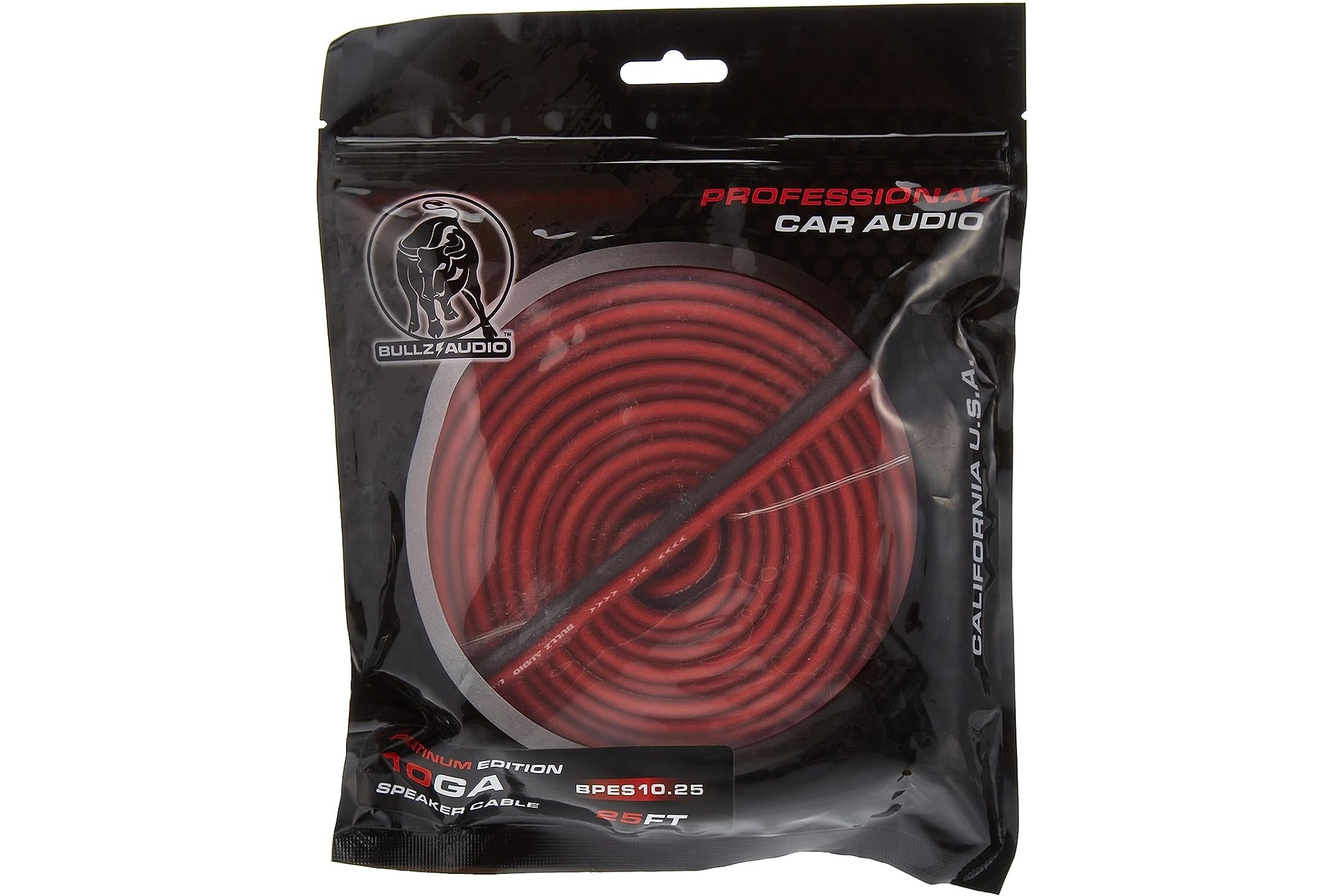
Bullz Audio speaker wire for home theater – Best performance
Get ready to experience an amplified difference in your home theater system with the Bullz Audio speaker wire for home theaters. This option isn’t just any run-of-the-mill speaker wire—it’s a true game-changer for audio enthusiasts. The cable’s red and black design is a visual treat, and it’s available in several lengths and gauges to suit any setup. Whether you need a modest 150 feet or a whopping 500, this wire has got you covered. With gauges ranging from 10 to 16, you’ll find just the appropriate wire to meet your audio needs.
What sets this speaker wire for home theaters apart isn’t just its eye-catching design or comprehensive length and gauge options. It’s the noticeable difference in audio performance. This speaker wire doesn’t just transmit sound—everything sounds clearer, crisper, and more powerful with this wire, from the tinny treble notes to the deep bass beats. If you’re serious about your sound and ready to take your home theater system to the next level, this option might be ideal.
Pros:
- Ideal for car and garage audio systems
- Noticeable improvement in performance
- Enhances audio quality
Cons:
- Not suitable for high-end audio setups
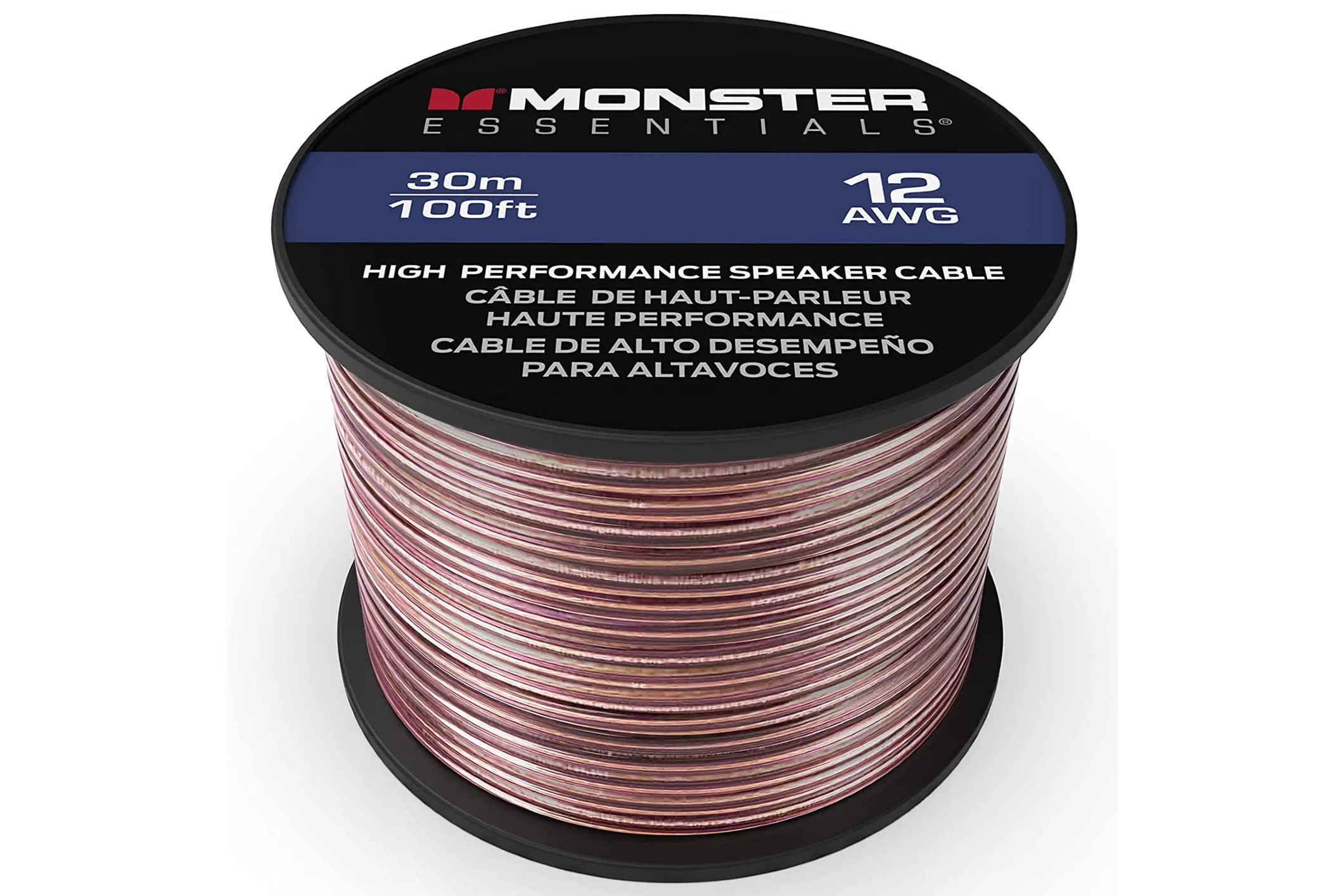
Monster speaker wire for home theater – Best value
The Monster speaker wire for home theaters is not just another wire—it’s a game-changer for your home theater setup. The clarity of sound is simply unmatched. It feels like the performers are right there in your living room, serenading you. This speaker wire is also incredibly cost-effective. You get a 100-foot spool, which is more than enough for any home theater setup, and the sheer durability of the wire means it will last you a good long while.
The copper-clad aluminum design ensures top-notch sound quality and signifies strength and longevity. It’s perfect for car audio cables as well. If you’re in search of the ideal speaker wire for a home theater, your search ends with this speaker wire for home theaters. It’s not just a purchase, but an investment in quality sound.
Pros:
- Improved sound quality
- Available at an affordable price
- Features high-quality materials
Cons:
- May not fit all speaker posts

Speaker wires for home theaters: a buying guide
Setting up a home theater is a task that requires careful thought and attention to detail. While it’s easy to focus on the more obvious components like the projector and speakers, it’s also crucial to not overlook the smaller, yet equally essential parts like the speaker wire. The speaker wire serves as the bridge between your amplifier and speakers, and the quality of this wire can significantly impact the overall sound quality of your home theater system. This guide will help you understand the key factors that you need to consider when buying the right speaker wire for your home theater.
Speaker wires come in various sizes, materials, and designs, each with its own set of advantages and disadvantages. While some may think that all speaker wires are the same, this is far from the truth. The difference in sound quality, clarity, and overall performance can be quite significant depending on the type of speaker wire you choose. The key factors to consider when choosing a speaker wire are wire gauge, material quality, cable design, insulation, and connectors.
Wire gauge
Wire gauge, or AWG (American Wire Gauge), refers to the thickness of the speaker wire. The lower the AWG number, the thicker the wire. Thicker wires are better suited for transmitting signals over long distances without losing quality, which is crucial for home theaters where speakers may be far from the amplifier. As a general guideline, a 16-gauge wire is suitable for distances up to 50 feet, while a 14 or 12-gauge wire is better for longer distances.
Material quality
The material of the speaker wire affects its conductivity and sound quality. Copper is common because of its excellent conductivity and affordability. For superior performance, consider wires made from oxygen-free copper (OFC), as they have fewer oxygen impurities, reducing the risk of oxidation and improving signal transmission. If budget is not a concern, silver wire, with its superior conductivity to copper, is a worthy consideration.
Cable design
Speaker wires come in solid-core and stranded. Solid-core options use a single, solid wire to transmit signals, offering clearer sound quality, particularly over long distances. They are less flexible and more prone to breakage. Stranded wires, made up of multiple thin strands of wire, are more flexible and durable. This feature makes them ideal for home theater setups where wires need to be bent or routed around obstacles.
Insulation
Quality insulation is a must for any good speaker wire. It protects the wire from external damage and interference. Look for wires with thick, durable insulation that can withstand rough handling. Wires with shielding, such as foil or braided shielding, can help protect against electromagnetic interference and maintain sound quality.
Connectors
The connectors at the ends of your speaker wire can make a significant difference in the performance and reliability of your wire. High-quality connectors ensure a stable, long-lasting connection. Gold-plated connectors, which offer excellent conductivity and are resistant to corrosion, are a great choice. Banana plugs and spade connectors are also popular due to their secure connection and ease of installation.
Conclusion
Choosing the ideal speaker wire for your home theater is more than picking the cheapest option. By considering the wire gauge, material quality, cable design, insulation, and connectors, you can vastly improve the sound quality of your home theater system. While it may seem like a minor detail, a good speaker wire can play a major role in enhancing your overall audio experience. So take the time, do the research, and make sure to choose the top speaker wire for your home theater setup.
Common questions about speaker wires for home theaters
Q: What is speaker wire and what is it useful for?
A: Speaker wire is a type of electrical wire that can connect speakers to audio amplifiers or receivers. It carries the audio signals from the amplifier to the speakers in your home theater system.
Q: How can I determine the right gauge of speaker wire for my home theater system?
A: The right gauge depends on the length of wire you need and the impedance of your speakers. For short distances, a 16-gauge wire is typically sufficient for most speakers. For longer distances, a thicker wire like 14 or 12-gauge may be necessary.
Q: How do I connect speaker wire to my home theater system?
A: To connect your speaker wire, strip the ends of the wire to expose the bare metal and then connect one end to the speaker terminals and the other end to the amplifier or receiver. Ensure that you connect the positive and negative terminals correctly to avoid phase issues.
Q: Does the quality of the speaker wire affect the sound quality in my home theater?
A: While the quality of the speaker wire can have an effect on sound quality, it’s often not as significant as the quality of your speakers or amplifiers. Using a high-quality, appropriately gauged wire can help to ensure that you get the best possible sound from your home theater system.
Q: How do I maintain my speaker wires and ensure they last longer?
A: To maintain your speaker wires, keep them away from heat sources, avoid bending them excessively, and do not coil them tightly. If possible, run them along baseboards or walls to avoid foot traffic and potential damage.
Q: What should I do if my home theater is not producing any sound, could it be a speaker wire issue?
A: If your home theater is not producing sound, it could be due to a problem with the speaker wire. Check to make sure all connections are secure and that the wire is not damaged. If necessary, try replacing the wire to see if that resolves the issue.
Q: Does the color of the speaker wire matter?
A: No, the color of the speaker wire does not affect its performance. Speaker wires often come in two different colors to help you keep track of the polarity when connecting your speakers to an amplifier or receiver. You should consistently use the same color for the positive and negative connections on all of your speakers.



